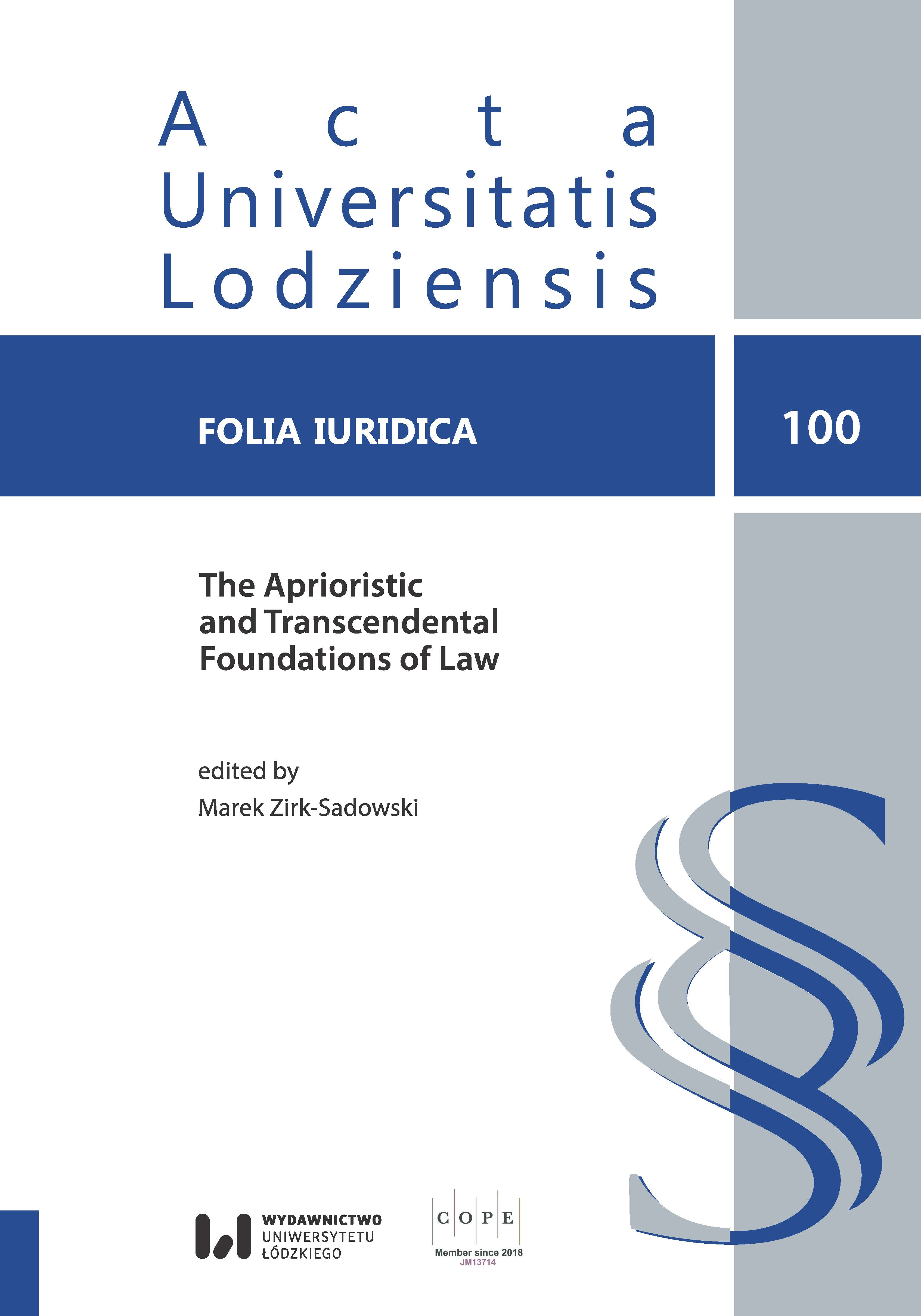Dwa sposoby uzasadniania Kantowskiej apriorycznej idei prawa
DOI:
https://doi.org/10.18778/0208-6069.100.03Słowa kluczowe:
idea prawa, zewnętrzna wolność, imperatyw kategoryczny, radykalne złoAbstrakt
Kant zaproponował aprioryczne ujęcie idei prawa, zgodnie z którym jedynym prawomocnym celem prawa jest zapewnienie każdemu obywatelowi możliwie szerokiego zakresu zewnętrznej wolności dającego się pogodzić z identycznym zakresem wolności innych obywateli. Kant nie rozjaśnił jednak w pełni tego, jak należy to ujęcie uzasadnić. W artykule zostały przedstawione dwa sposoby jego uzasadnienia oparte na Kantowskim obrazie natury ludzkiej. Pierwsze z nich odwołuje się do apriorycznych elementów tego obrazu (racjonalności, wolności, równości i godności), drugi – do elementów empirycznych (ambiwalentnego ujęcia przez Kanta ludzkich predyspozycji).
Pobrania
Bibliografia
Bekrycht, Tomasz. 2019. “The Idea of Positive Law – Immanuel Kant’s Transcendental Argument.” Avant. Pismo Awangardy Filozoficzno-Naukowej 4: 146–157. https://doi.org/10.26913/avant.2019.01.09
Google Scholar
DOI: https://doi.org/10.26913/avant.2019.01.09
Guyer, Paul. 2002. “Kant’s Deductions of the Principles of Right.” In Kant’s Metaphysics of Morals: Interpretive Essays. Edited by Mark Timmons. 23–64. Oxford: Clarendon Press.
Google Scholar
Kant, Immanuel. 1956. Critique of Practical Reason. Translated by Lewis White Beck. New York: Macmillan.
Google Scholar
Kant, Immanuel. 1963. Critique of Pure Reason. Translated by Nokman Kemp Smith. New York: St. Martin’s Press.
Google Scholar
Kant, Immanuel. 1964. Groundwork of the Metaphysics of Morals. Translated by Herbert James Paton. New York: Harper Torchbooks.
Google Scholar
Kant, Immanuel. 1978. Anthropology from a Pragmatic Point of View. Translated by Victor Lyle Dowdell. Carbondale: Southern Illinois University Press.
Google Scholar
Kant, Immanuel. 1991. The Metaphysics of Morals. Translated by Mary Jane Gregor. Cambridge: Cambridge University Press.
Google Scholar
Kant, Immanuel. 1999. “On the Common Saying: ‘This May Be True In Theory, But It Does Not Apply In Practice’.” In Political Writings. Translated by Hugh Barr Nisbet. 61–92. Cambridge: Cambridge University Press.
Google Scholar
Kant, Immanuel. 2008. Religion within the Limits of Reason Alone. Translated by Theodore M. Greene and Hoyt H. Hudson. New York: HarperOne.
Google Scholar
Kant, Immanuel. 2020. Die Metaphysik der Sitten. Berlin: Boer Verlag.
Google Scholar
Paton, Herbert J. 1946. The Categorical Imperative. A Study in Kant’s Moral Philosophy. London: Hutchinson University Library.
Google Scholar
Pogge, Thomas W. 2002. “Is Kant’s Rechtslehre a ‘Comprehensive Liberalism’?” In Kant’s Metaphysics of Morals: Interpretive Essays. Edited by Mark Timmons. 133–158. Oxford: Clarendon Press.
Google Scholar
Uleman, Jennifer K. 2004. “External Freedom in Kant’s Rechtslehre: Political, Metaphysical.” Philosophy and Phenomenological Research 68(3): 578–601. https://doi.org/10.1111/j.1933-1592.2004.tb00367.x
Google Scholar
DOI: https://doi.org/10.1111/j.1933-1592.2004.tb00367.x
Wood, Allen W. 1999. Kant’s Ethical Theory. Cambridge: Cambridge University Press.
Google Scholar
Pobrania
Opublikowane
Jak cytować
Numer
Dział
Licencja

Utwór dostępny jest na licencji Creative Commons Uznanie autorstwa – Użycie niekomercyjne – Bez utworów zależnych 4.0 Międzynarodowe.














